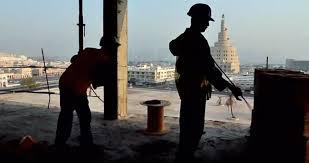By Andrew Warshaw
February 12 – Steps by Qatar’s 2022 World Cup organisers to put in place improved conditions for migrant workers have been welcomed by FIFA but criticised by trade union officials despite being drawn up in conjunction with the International Labour Organisation (ILO).
A new and detailed report from the Qatari authorities, published just a day before a FIFA deadline, is being used for tomorrow’s symbolically important hearing on the issue at the European Parliament in Brussels where FIFA are being represented by executive committee member Theo Zwanziger.
The Brussels session is a follow-up to an emergency resolution passed in November condemning the widespread abuse of migrant workers in Qatar and urging FIFA to “send a clear and strong message” to the authorities there to clean up their act.
The resolution reminded FIFA “that its responsibility goes beyond the development of football and the organisation of competitions” and called on Qatar to reform and uphold its labour laws.
Two days before Thursday’s Brussels meeting, the Gulf state’s World Cup authorities issued detailed guidelines which they hope will answer international condemnation of their employment laws.
The 50-page report, entitled ‘Workers’ Welfare Standards’, gives a comprehensive breakdown of the measures that 2022 organisers expect contractors and sub-contractors to employ once stadium and infrastructure projects get under way.
FIFA, which had given the Qataris a February 12 deadline to explain what measures were being put in place, welcomed the “concrete steps …announced by the Supreme Committee for Delivery and Legacy to ensure the welfare of workers for the 2022 FIFA World Cup.”
In a statement released to Insideworldfootball, FIFA added it was “pleased with the commitment of the local organisers to use the hosting of the FIFA World Cup to accelerate adequate uniform working standards in Qatar.”
“We take positive note of Qatar’s Supreme Committee for Delivery and Legacy approach in engaging with the relevant stakeholders and competent agencies such as the International Labour Organization (ILO). It is now important to continue the initiated activities in this manner in a joint effort with all stakeholders.”
But if Qatar thought their attempts at reform would be universally accepted, they found themselves on the receiving end of a barrage of criticism from the International Trade Union Confederation which claimed the guidelines were flawed, not least regarding the controversial kafala system which ties migrant workers to their jobs until and unless their “sponsor” employers give permission for them to leave the country.
“Qatar’s new World Cup worker welfare standards do not deliver fundamental rights for workers and merely reinforce the discredited kafala system of employer control over workers,” claimed the ITUC.
Sharan Burrow, the organisation’s Australian general secretary, said: “It promises health and safety but provides no credible enforcement. It promises employment standards but gives migrant workers no rights to collectively bargain or join a trade union. It promises equality but does not provide a guarantee of a minimum wage.”
“The kafala visa sponsorship system ties workers to their employers, as they cannot leave the country or move to another employer without permission. Qatari law denies migrant workers the right to form or join trade unions.”
In the detail of the newly published welfare standards, the Qataris address the kafala issue by pledging workers will only be expected to work eight hours a day and a 48-hour week, be paid overtime, take proper holidays and “shall be entitled to terminate their Employment Contract without notice”.
In addition, on completion of any contract, employers must “pay for the repatriation travel expenses” of all migrant workers. It is also made clear that breaches of workers’ rights will be punished accordingly.
The ITUC stridently maintains that provisions for the monitoring and enforcement of the new standards are and will be inadequate. This is likely to be the area going forward that will get most media and union attention. For their part it would be naive to assume that the Qataris don’t know this, or are not preparing for it.
Contact the writer of this story at moc.l1744832458labto1744832458ofdlr1744832458owedi1744832458sni@w1744832458ahsra1744832458w.wer1744832458dna1744832458

